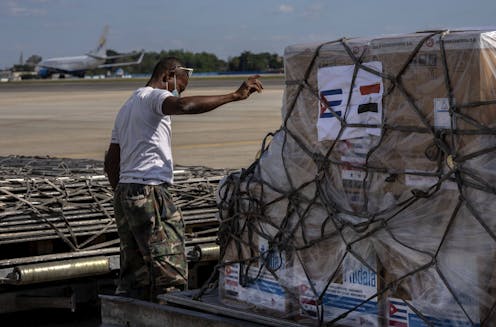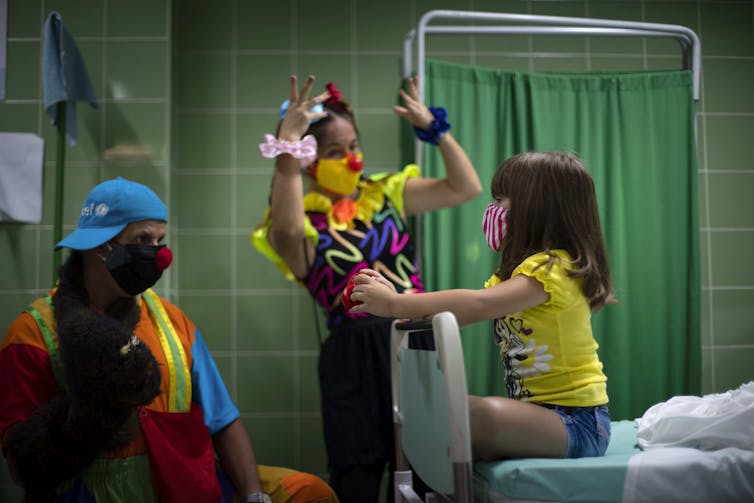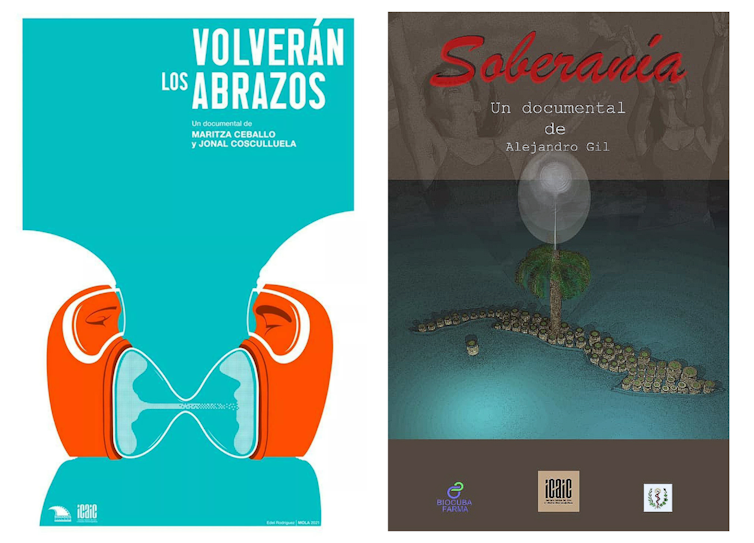
Vaccines could be saving the world from COVID-19, but they aren’t. Almost everywhere, vaccine access or vaccine hesitancy are our Achilles heels.
Vaccine access correlates to GDP, and higher income countries can strike deals with pharmaceutical companies. Vaccination programs also deploy less of these countries’ health-care budgets — 0.8 per cent versus 56.6 per cent for lower-income countries.
Read more: Cuba's push for coronavirus vaccine sovereignty
By developing and administering its own vaccines, Cuba has ensured affordable coverage (0.84 per cent of health-care costs), despite the United States embargo blocking medical supplies, including during the pandemic.
That same blockade is impeding vaccine export from Cuba and has risked thwarting vaccine import to the island. Despite these challenges, Cuba is now one of the most vaccinated countries in the world.
Cuba’s public health
Vaccine hesitancy is rare in Cuba. Its COVID-19 policies and practices are fundamentally science-based. The Cuban government is garnering public support by protecting its citizens from grave illness and death; one of governments’ primary mandates.
This small nation blocked an Omicron spike through its vaccinations and social hygiene measures.
Not-for-profit and universal, Cuba’s public health incorporates standardized, robust immunization schedules that have been the norm for decades. Many medicines and vaccines in the country are created by publicly funded national labs.
Factual, positive analysis on Cuba typically draws fire internationally, with critics objecting that its government controls information.

Why Cubans trust vaccines
In December 2021 and January 2022, I asked open-ended questions directly to 40 Cuban residents — acquaintances, colleagues and friends from my more than 20 years studying Cuban culture and, since 2020, Cuba’s COVID-19 response.
In January and February, I collected 40 anonymous responses via a VoIP survey with the assistance of my colleague Alejandro Mestre. While not statistically representative, this study is indicative. Every respondent — even government naysayers — wanted to be vaccinated.
As she rubbed the veins of her inner forearm, an office worker joked: “Yes, everyone has confidence in the vaccines. You know, sometimes I think, because the Cuban doctors know us, the vaccines have a component of us in them.”
Read more: The scene from Cuba: How it's getting so much right on COVID-19
This widespread, popular confidence is based on lived experience.
Since the 1960s, Cubans have followed a robust vaccine scheme from childhood onward, with the subsequent experience of protection from contagious disease. In one respondent’s words, “I am not sure of the effectiveness of this vaccine, nevertheless, I know that in my country we have been making globally recognized vaccines for many years.”
Residents often compare Cuba with other countries. Many have travelled abroad, including those in the Henry Reeve Brigade — a group of Cuban medical professionals, deployed worldwide during major health crises with the mission of international medical solidarity — and confronted deadly outbreaks like COVID-19. Many also have loved ones abroad and see the difference between the low contagion rates in their country versus the higher rates in countries without widespread vaccination.
Inhabitants of this tropical, middle-income island have personal experiences with infectious diseases, including meningitis (Cuba developed a vaccine) and dengue (Cuba developed public health measures and a medication, interferon alpha-2b).
Why Cubans trust vaccines: Clear messaging
Messaging about the benefits of vaccination, and other public health practices, for individual and societal good is clear and constant in Cuba.
It includes news briefings from the national director of epidemiology, Dr. Francisco Duran, infomercials, popular songs and billboards and human-focused documentaries about doctors in COVID-19 wards like Volverán los abrazos (hugs will return) and on the scientists developing vaccines, like Soberania (which means sovereignty). Further, the respondents of my inquiry believe that Cubans don’t pay much attention to fake news about vaccines that arrives from abroad via social media.
Although not mandated, vaccination is the norm. Primary care providers must obtain an informed consent waiver from patients who decline inoculation and there is peer pressure.
One interviewee wrote, “In the situation in which this pandemic has placed the world, there is no space not to get vaccinated. It is very egotistical.” Another added, “The liberty of every person must not curtail the liberty of others.”
Most Cubans trust in the expertise of their densely woven and interconnected web of health services. “In Cuba, one might die from lack of specialized machines or medicine, but not from lack of specialized, human care,” said one respondent.
Even Cubans who are skeptical of their government in other areas stated that the only reason for Cuban medical experts to do their work is to save lives. In contrast, many talked about how financial interests play into health care in other countries, making it potentially less trustworthy.

Cuba’s vaccine rollout
In Cuba, the immunization campaign continues. Cuba began vaccinating children two years and older in September 2021, well before most other — and much richer — countries. It’s now running Phase 2 clinical trials with children under age two.
Cuba is not putting its children at risk; it’s using time-tested research — vaccine platforms used previously for other vaccines — to ensure everyone gets vaccinated as quickly and as safely as possible.
And, while subunit vaccines are considered slow to create and the U.S. embargo slowed development and rollout, Cuba beat other protein subunit vaccines to the finish line.
Developers of U.S.-based Corbevax scrambled for investors to enable research and development, while Cuban national labs simply pivoted to meet the need.
Read more: CORBEVAX, a new patent-free COVID-19 vaccine, could be a pandemic game changer globally
Subunit vaccines have incredible promise as workhorses. Although harder to tweak than mRNA, they are cheaper, less finicky and have much longer track records, the latter of which is particularly relevant for vaccinating children.
While Cubans trust their health experts, the international pharmaceutical industry’s track record — recently with their role in the opioid crisis — is fuelling popular skepticism towards vaccines, also among minority groups.
The idea that market-driven innovation facilitated mRNA technology is misleading. Hungarian-American biochemist Katalin Kariko, whose research enabled mRNA vaccines and who is a contender for a Nobel Prize, struggled for funding, as have other innovators.
Cuba continues working to stop the pandemic, exporting vaccines and transferring production technology to countries including Argentina, Bolivia, Iran, Mexico, Nicaragua, Syria, Venezuela and Vietnam. It’s acting on the scientific fact that humanity will be safest when all who can be vaccinated are vaccinated. Cuba is following the science and earning its trusted reputation.
Jennifer Ruth Hosek does not work for, consult, own shares in or receive funding from any company or organisation that would benefit from this article, and has disclosed no relevant affiliations beyond their academic appointment.
This article was originally published on The Conversation. Read the original article.







